There’s a bear, just sitting on the roadside. Surely somebody must have called the emergency services? The B709 is a quiet road, but not that quiet. It slowly dawns on me it’s probably not a bear and after some studied looking as I slowly grind past it turns out to be heather.
I’ve entered the hallucination stage of adventure racing. I’ve been going hard for 40 hours, and the combination of sleep deprivation and exertion is taking its toll.
This is expedition adventure racing and while this particular event is considered a 'lite' version, it’s still a three-day, 300km race comprising of running, mountain biking and kayaking, with some special stages thrown in. But this description doesn’t do it justice.
Once the race starts, the clock is ticking and sleep is optional. You need to be on the ball with your navigation as GPS devices aren’t allowed, instead relying only on maps and compasses.
It’s my second-ever adventure race after a failed attempt at the full-fat ITERA in 2019 with three friends. We were beaten by the course back then, and this year I’ve returned with Megan, one of my teammates from 2019, to compete as a pair.
After months of planning, getting the necessary equipment sorted and failing to do the training that we said we would, we arrived at race HQ in Selkirk in the Scottish Borders.
A race against time
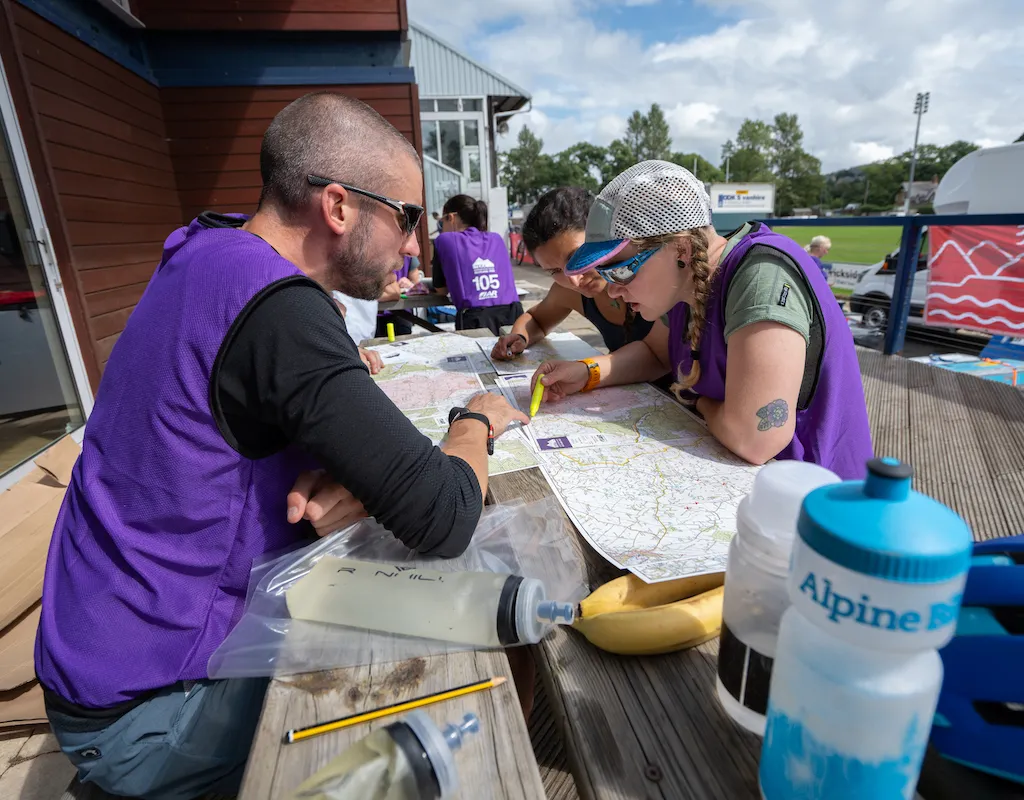
In adventure racing you don’t get to see the course until just a couple of hours before the start. In this case, the course is revealed at midday and the race starts at 4pm on the Friday.
Everyone gathers at HQ for the big reveal, settling into a hushed silence and suddenly there it is. The first cycle, stage three, is a massive 175km, mainly off-road with an estimated time for the slower teams, of which we are one, of 22 hours. We quickly collect our maps and scurry off to our van to start the route planning.
ITERA is unique in the adventure racing world in offering short- and long-course options. You can elect to miss out non-mandatory checkpoints and take time penalties instead. This is done so that all teams, in theory, can get to the finish line while it's still open.
We quickly decide to drop the first two checkpoints of stage three, which are in the Cheviot Hills, which will cost us one hour each, and instead go along a lane for a further 30km before heading up onto the Cheviots. We’ll then do the rest of the stage.
Megan points out the Forest Drive in Kielder Forest, although longer, will be easier going than the more direct bridle way. There’s not much to do for stage one, which is a 10km run up and over from Selkirk to Yair Bridge with a mandatory checkpoint at the hill saddle.
Stage two is a 40km kayak down the River Tweed to Kelso, with not much navigation except for the portages over the weirs.
Stage four, however, is a killer – a 40km trek over multiple hills upon which lie several checkpoints. Very little of it is on paths.
A quick recce of the checkpoints tells us two of them carry four-hour penalties and the rest are roughly one-hour penalties, so we plan to do just the two checkpoints with the four-hour penalties.
We run out of time to do any planning for stages five, six and eight (there is no stage seven) and accept we’ll just have to deal with these when we come to them. Not ideal.
Fast and furious
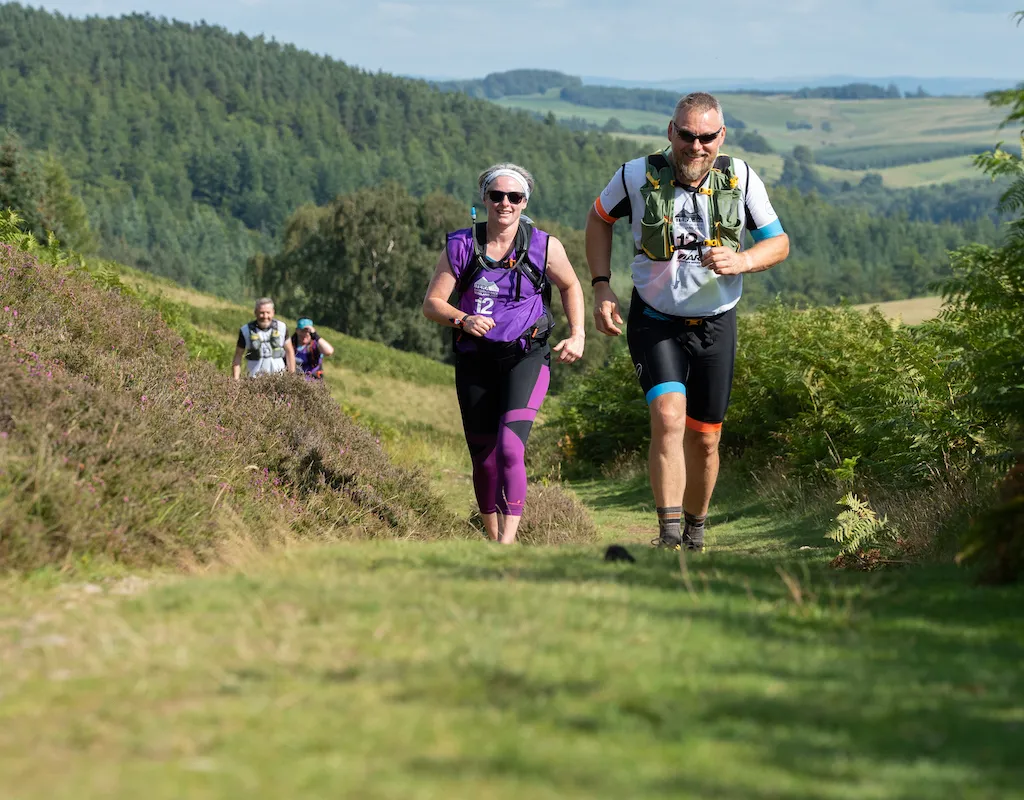
The countdown for the start soon arrives and we’re quickly off jogging along Ettrick Water and then up into the hills. It’s a good path, mainly runnable and, with some great navigation from Megan, it’s not long until we’re reaching stage two.
A quick change into kayaking gear and we’re ready to go. There’s a rapid at the put-in and most teams are capsizing, but there’s no dithering for us and, given my lack of paddling skills, Megan does a great job of getting us down the rapid.
That is until, in my enthusiasm for making it down safely, I cause the kayak to capsize. What a numpty. There are lots of little rapids and it doesn’t take me long to start to feel comfortable.
It takes a long time to kayak 40km, even with a fast-flowing river, and soon enough darkness falls. This brings a whole new element of fun to the kayaking and, bizarrely, makes us braver.
In the dark we kayak down the two big rapids, where it’s suggested that you get out and portage round. Lady Luck must be on our side, as we go down one of them backwards after getting stuck on a rock.
At midnight we arrive in Kelso, about an hour earlier than we’d expected. It takes us an hour to get changed, build the bikes, pack the kayaking stuff away and have our hot meals.
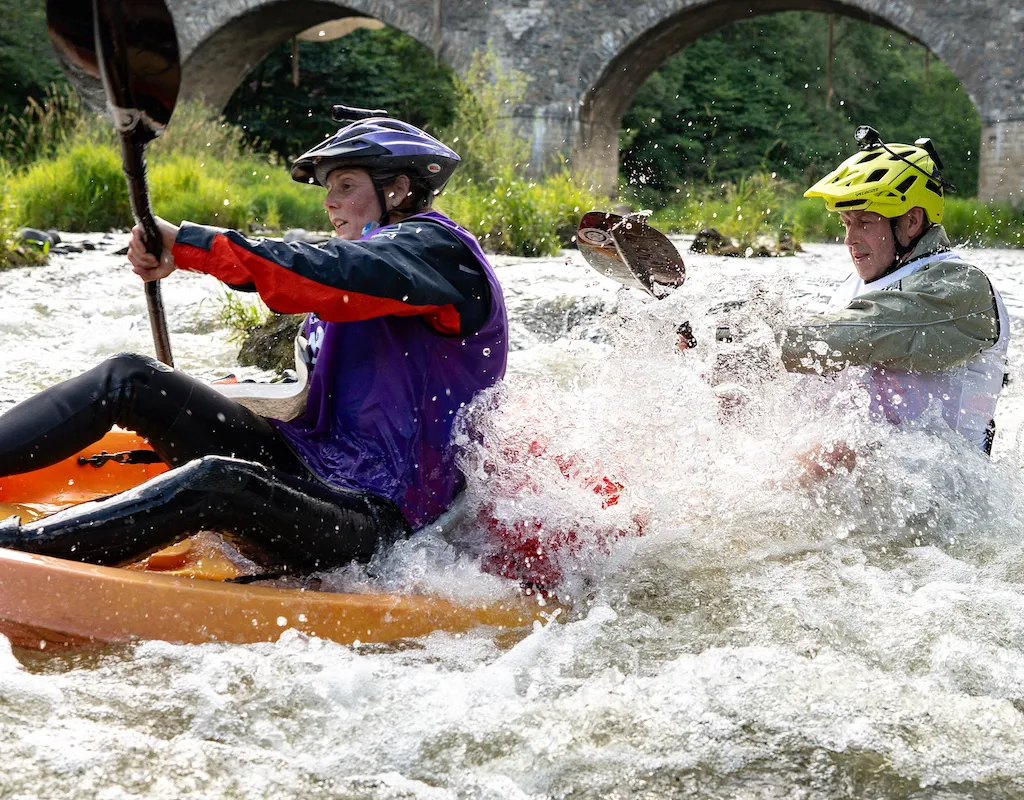
A twist of luck
We set off on the bikes at 1am and initially go completely the wrong way, but thankfully realise our mistake quickly. We ride until 2:30am and then decide that as it’s dry we’ll get into our bivvy bags for an hour’s sleep.
Before long, we’re on the bikes again, heading up into the Cheviots as dawn breaks. We hike-a-bike up and find the checkpoint where we cross into England and then it’s south to Kielder.
Unfortunately, my front brake is jammed on as I forgot my brake pad spacers. This is doubly annoying, not only because I’m using more energy, but also because of the screeching.
After seven hours of it I’m beginning to lose it, but then fate smiles on us. At Kielder Castle both the coffee shop and bike hire shop are open – coffee, bacon rolls, cakes and bike tinkering follows. Feeling rejuvenated we cycle quickly around Kielder Water to Calvert Trust Activity Centre to do three special stages.
The special stages are pretty epic: a roller coaster zip line; a climbing wall where I climb blindfolded and Megan climbs with a boxing glove on; and a leap of faith. This last one involves scaling a telegraph pole, standing up on a small platform and then leaping off to try grab a trapeze swing (see below).
Megan makes it look easy but I can’t do it, and I’m told I’ll get a one-hour time penalty for non-completion. I have a good talking to myself, get up there and do it. I’m not sure I’ve ever been so scared…
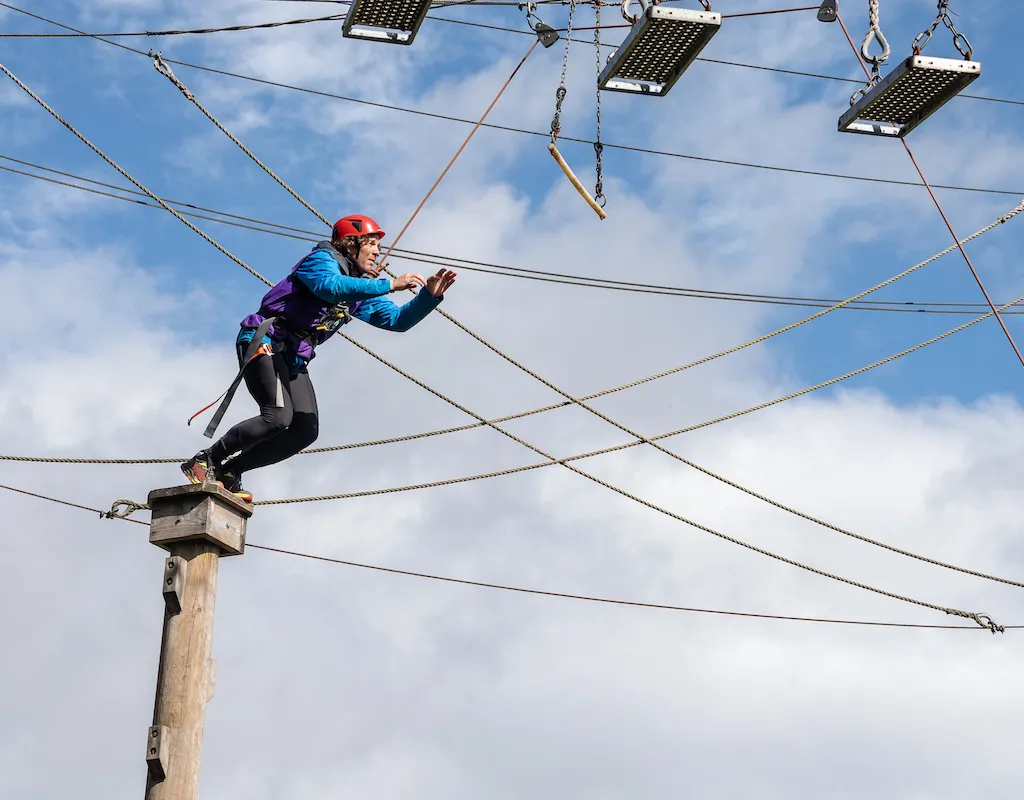
The blind leading the blind
We cross back into Scotland and at the Shankend Viaduct there’s another special stage – we have to abseil off of it. We’re then back on the bike towards Hawick, tiredness kicking in and our pace beginning to drop.
We head east from Hawick towards Craik, which is where the navigation fun really starts, as we’ll be navigating through forest in the dark.
Having only really seen glimpses of other teams for most of the cycle we’re surprised to see so many other teams rushing about in Craik. We find a forest road that looks like it’ll join up with our pre-planned route and set off.
Night-time navigation in a forest is downright tricky, as you have no visual references and all forest roads look the same in the dark. I keep us on what I think is our pre-planned route but the doubts creep in. A few kilometres further up the track there’s a sizeable loch and a fairly new road, neither of which are marked on the map.
In fact, the nearest body of water on the map is more than 10km away. Surely we can’t be that far out?! We decide to carry on along what I think is the correct route while other teams doubt themselves and turn around.
The route gradually stops feeling like it looks on the map. By now, I reckon we’re only a few kilometres from the end of the forest, though distance is very tricky to judge with no GPS and a best guess at your speed!
I reason that so long as we generally keep heading north we’ll get out of the forest without too much of a cost. Eventually, we come out on our planned route, though many teams spent hours longer in this forest and some bedded down to await daylight.
We cycle the last two kilometres to transition in Ettrick and finish stage three after 24 hours on the bike. Time to put the tent up and grab a couple of hours sleep.
Mind games
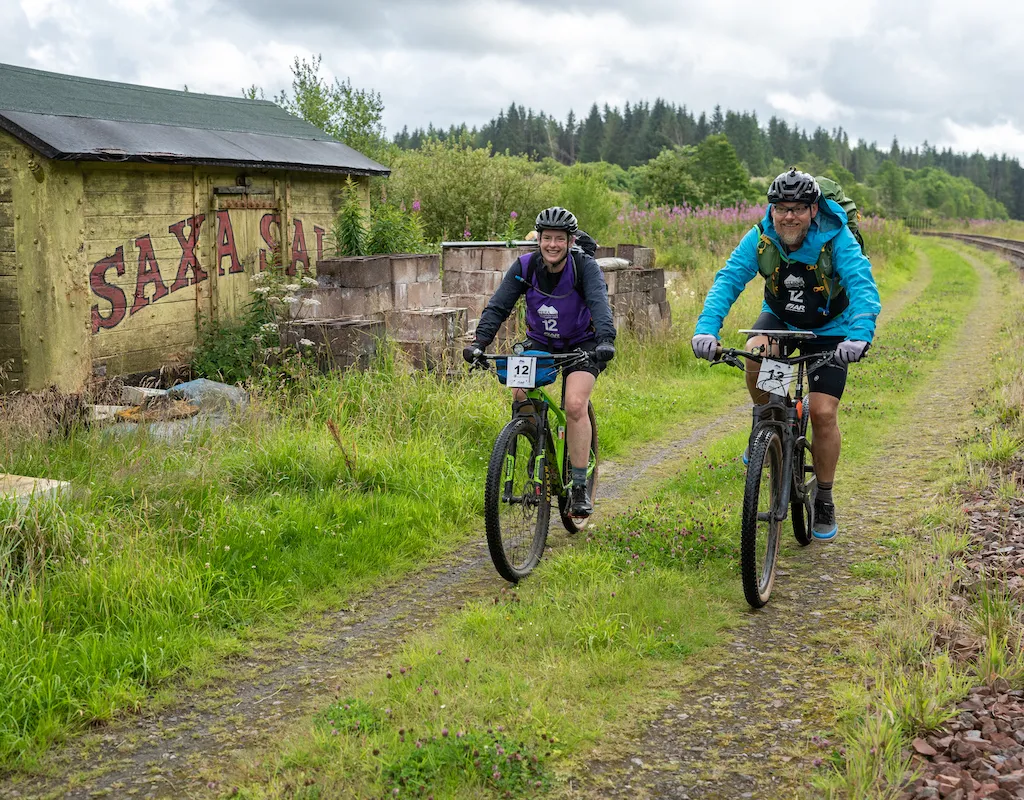
By the time we wake up the weather’s deteriorated. We take the decision to omit all optional checkpoints on stage four and take the Southern Upland Way direct to St Mary’s Loch. By the time we get there I’m starting to slow.
I take an extended stay at transition as Megan looks after me, feeding me hot soup and coffee. We decide to take the B709 to Innerleithen, which means we can avoid the higher summits of the Southern Upland Way. I’m still not in a good place and have no power on the bike.
As we cycle up the hill there’s that bear, just sitting on the roadside. The B709 is a quiet road, but not that quiet and I’m sure that someone in a passing vehicle would have called the emergency services. It slowly dawns on me that I’ve entered the hallucination stage.
Megan calls out for a pitstop and I happily agree. My aim now is simply to finish, so we decide to omit all checkpoints and take the easiest possible route. I’m feeling nauseous and sure enough, I start vomiting. I struggle on and we get to Peebles.
Next up is a 10km paddle to Walkerburn. Just as we’re getting in the water we’re informed of a newly submerged tree in a set of rapids. It’s a fairly relaxing paddle except I have no energy and can barely keep my eyes open, so Megan is doing all the work. Thankfully, the river is in full flow from the deluges.
We get to the submerged tree, which is less than one kilometre from the end of the stage and duly get out to portage round the obstacle.
It’s a tricky portage and we both cool right down, starting to shiver quite violently, but there’s nothing to do except get back in the kayak and finish the stage.
Down but not out
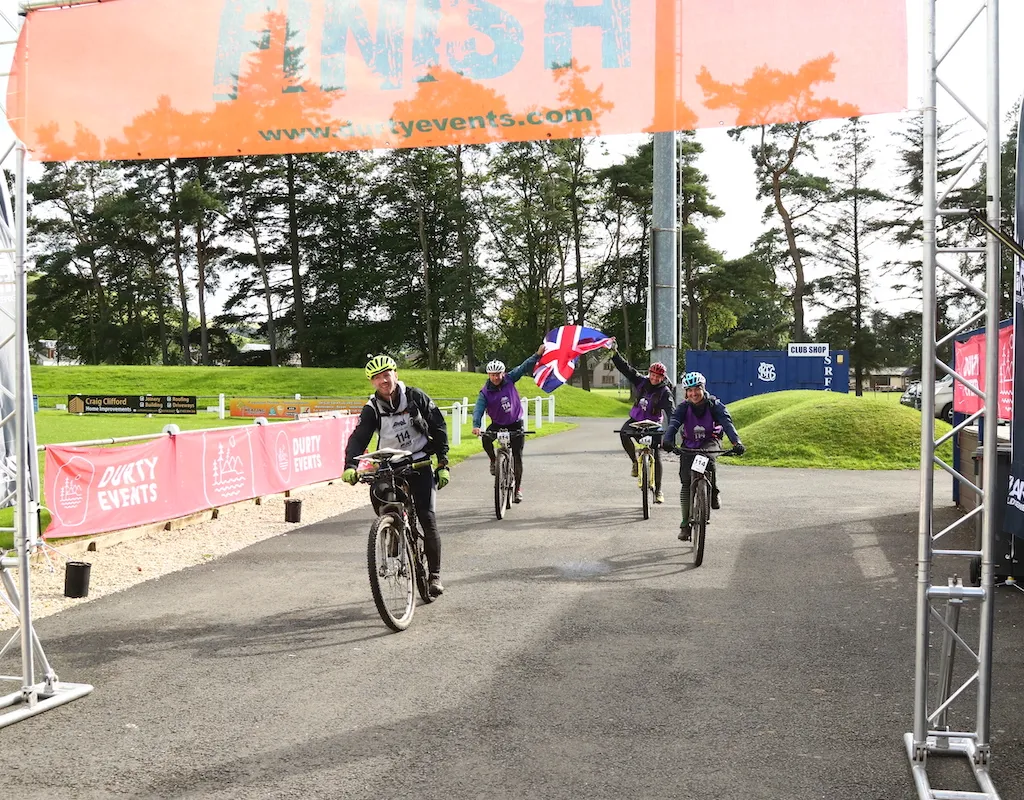
I change for the final cycle and begin to warm up. The weather has changed, too, and is now sunny. Megan is not warming up but makes the call to do the final cycle.
It’s now 5pm on Sunday and if all goes well we should finish Sunday night. However, it quickly becomes apparent that all is not well with Megan. I make the call to turn us around. ‘This is it, we’re out, another DNF’, I think.
Back in Innerleithen, while pondering how to get back to Selkirk, Megan quotes me one of the top tips she recalled from our first ITERA: never retire in the evening – sleep on it and make the decision in the morning.
I pop off to get a hotel room and we’re asleep by 8pm. Megan has a bout of vomiting in the night but we rise at 4am feeling refreshed and decide to try again on the last stage, as the finish line is open until 10am. Megan is still poorly, but we go steady on the ride and cross the line at 8:26am on Monday morning. We’ve done it. We’ve finished ITERA-lite!
The finish is like a scene from a zombie movie. Everyone is out of it, with sleep deprivation and exhaustion running riot. We finished with a race time of 64 hours and 24 minutes, but have 36 hours of time penalties, giving us a total time of 100 hours and 24 minutes, placing us in 23rd.
In total, 41 teams started, 11 retired, four finished non-competitive, 16 finished short course and 10 teams completed the full course. The winners managed this in a staggering 51 hours 32 minutes – with only 42 minutes of sleep in a roadside ditch!
Race stats
Distances
Stage 1: Run 10km
Stage 2: Kayak 40km
Stage 3: MTB 175km
Stage 4: Run 40km
Stage 5: MTB 30km
Stage 6: Kayak 15km
Stage 7: MTB 25km
Dave & Megan’s time: 100 hours and 24 minutes
Winner’s time: 51 hours 32 minutes
Top image credit: Durty Events
